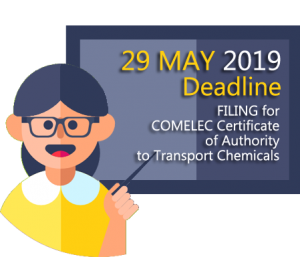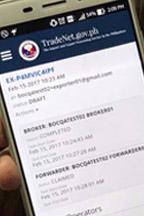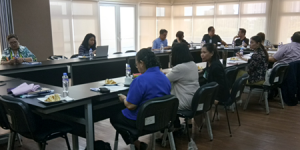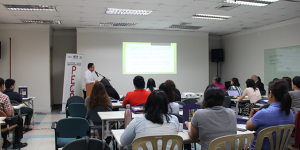 On March 17, further operational guidelines under the Inter Agency Task Force for the Management of Emerging Infectious Disease (IATF-EID) concerning the implementation of the “Enhanced Community Quarantine (ECQ)”, ordered that “All government agencies in the Executive Branch are hereby directed to issue accreditation orders to identify their respective skeletal workforces for critical services operating during the duration of the enhanced community quarantine in Luzon…” Continue reading “BOC addresses ECQ accreditation order thru OCOM Memo No. 62-2020 “
On March 17, further operational guidelines under the Inter Agency Task Force for the Management of Emerging Infectious Disease (IATF-EID) concerning the implementation of the “Enhanced Community Quarantine (ECQ)”, ordered that “All government agencies in the Executive Branch are hereby directed to issue accreditation orders to identify their respective skeletal workforces for critical services operating during the duration of the enhanced community quarantine in Luzon…” Continue reading “BOC addresses ECQ accreditation order thru OCOM Memo No. 62-2020 “
Philippines joins ASEAN exchange of electronic Certificate of Origin
 The Philippines can now exchange electronic Certificate of Origin (e-CO) with Indonesia and Malaysia as it joins ASEAN Single Window (ASW) Live Operation on 30 December 2019.
The Philippines can now exchange electronic Certificate of Origin (e-CO) with Indonesia and Malaysia as it joins ASEAN Single Window (ASW) Live Operation on 30 December 2019.
The e-CO refers to the ASEAN Trade in Goods Agreement (ATIGA) Form D, an international trade document attesting that goods in a particular export shipment were wholly obtained, produced, manufactured, or processed in a particular country.
As confirmed in an email by the ASEAN Secretariat, “the remaining AMS (ASEAN Member States) will need more time to complete domestic procedures and resolving remaining technical issues”.
Consequently, the Bureau of Customs, through its Export Coordination Division (ECD) and Export Divisions in selected ports shall now issue e-CO using the TradeNet platform pursuant to Customs Memorandum Order (CMO) 15-2019.
The Order governs the application, submission, and processing of e-CO and aims “to facilitate the transmission of e-CO for export products and the receipt of e-CO for imported products.” Meanwhile, the TradeNet covers the functions of the Philippine National Single Window (PNSW). It serves as an automated permit, licensing, and clearance system integrated into one platform for 66 Trade Regulatory Government Agencies (TRGAs) and 10 economic zones. ARB
Food exporters can now secure Export/Commodity Clearance in one day
October 2019, food exporters can now secure Food Export Certificate and Commodity Clearance in one day following the Food and Drug Administration (FDA) move to streamline its process and revision of application form. The old process requires exporters to wait 2-3 days to secure Export/Commodity Clearance.
In an advisory presented during the FDA Forum with Food Exporters on 22 October 2019, it noted that “In consonance with the provision of Republic Act No. 11032 otherwise known as the “Ease of Doing Business and Efficient Government Service Delivery Act of 2018”, the Common Services Laboratory (CSL) revised the current application forms template and process flow in the application of Food Export Certificate and Food Commodity Clearance”. Commodity Clearance is used to prove that the export product is freely sold in the country and safe for human consumption.
To apply for Export/Commodity Clearance, applicants shall submit two (2) copies of accomplished Application Form, photocopies of License to Operate and Certificate of Product Registration, Packing List or Sales Invoice and flash drive (will be returned to applicant) containing the filled templates of the draft Certificates and database.
Revised application form and process flow can be downloaded in the FDA website.
Exporters shall proceed to FDA-Common Services Laboratory office at Starmall Alabang. However, for applicants outside Metro Manila, regional/online application is targeted to be implemented by FDA in 2020.
Instrument of accession to the Istanbul Convention for ATA Carnet awaits President’s approval
The ATA Carnet system is an international scheme that will allow temporary admission and tax-free and duty-free importation of commercial samples, professional equipment and articles for presentation or use in trade fairs, shows, and exhibitions without customs formalities.
The system will also allow traders to use ATA Carnet secured by an international guarantee system. The ATA Carnet is a single document of goods that will pass through several customs territories and will be valid up to one (1) year. It will foster free movement of goods between countries, thus saving costs and time in clearing goods at the border. Failure to re-export all goods listed on the Carnet will result in the payment of applicable duties.
The Department of Finance (DOF), in a letter to the Department of Foreign Affairs (DFA) dated 8 August 2019, requested the preparation of the Instrument of Accession subject to certain conditions. It also underscored that the Convention will “help promote efficiency, consistent with the Administration’s policy of promoting ease of doing business and efficient service delivery.”
Relevant government agencies such as the Department of Trade and Industry (DTI), Bureau of Customs (BOC), Bureau of Internal Revenue (BIR), Department of Tourism (DOT) and Tariff Commission signified their support by submitting their respective Certificates of Concurrence (COC) to the DFA through the DOF.
Once signed by the President, Senate ratification through the concurrence of at least two-thirds of its members is constitutionally required. The Convention provides that it shall enter into force three months after the Philippine has deposited its Instrument of Accession.
The implementation of the ATA Carnet system will support the Office of the President Memorandum Circular (MC) No. 27 which directs “all concerned agencies to strengthen the implementation of the Philippine Export Development Plan and involving other agencies in the development of the export sector”. Specifically, MC 27 mandates the DFA to advocate the Philippine Accession to the Istanbul Convention.- ARB
ADVISORY:

COMELEC emphasized the last day of filing for Certificate of Authority to Transport Chemicals being 29 May 2019.
The Commission on Elections (COMELEC) reminded entities engaged in the transport of chemicals that it will accept applications for Certificate of Authority to Transport (CA-TT) chemicals until 29 May 2019 which is the last day of filing of applications.
The CATT must be secured by said entities following the implementation of nationwide gun ban covering the period 13 January 2019 to 12 June 2019.
The reminder aims to prevent any delay in the clearance of shipments at the border or transportation of chemicals from 30 May to 12 June 2019, after the deadline of submission of applications. The COMELEC committed to process and issue CA-TT within 10 days from submission of complete documentary requirements. For the public’s guidance. -ARB
BOC to implement ASEAN Electronic Certificate of Origin (e-CO)
The Bureau of Customs (BOC) is set to implement the ASEAN electronic Certificate of Origin (e-CO) following the issuance of Customs Memorandum Order (CMO15-2019) which provides guidelines on the operational procedures in implementing e-CO.

The Order was issued pursuant to the Operational Certification Procedure (OCP) of the ASEAN Trade in Goods Agreement (ATIGA) and in compliance with the Customs Modernization and Tariff Act (CMTA). It aims to facilitate the application, processing, issuance, and transmission of e-CO for export products and the receipt of e-CO for imported products by utilizing the TradeNet system (tradenet.gov.ph).
The e-CO refers to the ATIGA Form D which is an international trade document attesting that goods in a particular export shipment were wholly obtained, produced, manufactured, or processed in a particular country. It will be transmitted electronically between ASEAN Member States (AMS) through the ASEAN Single Window (ASW).
Meanwhile, the TradeNet will cover the functions of the Philippine National Single Window (NSW). It will serve as an automated permit, licensing, and clearance system integrated into one platform for 66 Trade Regulatory Government Agencies (TRGAs) and 10 economic zones.
Application and Submission of e-CO to ASEAN Members States (AMS)
The exporters must then submit their application for outbound e-CO through
 the TradeNet system and attach all documentary requirements by uploading it to the system. If approved, the exporters will receive an email containing a downloadable and printable file for the e-CO. Otherwise, the Exporter/s will be informed of the reason for disapproval through email and may file another application for e-CO.Since the full electronic sharing of e-CO among AMS is not yet operational and while the AMS are addressing all technical failures, “the Exporter shall download then print the e-ATIGA Form D, place his or her signature in the appropriate space, and submit the system-generated ATIGA Form D to the Bureau (BOC) for manual execution of signature and seal”.
the TradeNet system and attach all documentary requirements by uploading it to the system. If approved, the exporters will receive an email containing a downloadable and printable file for the e-CO. Otherwise, the Exporter/s will be informed of the reason for disapproval through email and may file another application for e-CO.Since the full electronic sharing of e-CO among AMS is not yet operational and while the AMS are addressing all technical failures, “the Exporter shall download then print the e-ATIGA Form D, place his or her signature in the appropriate space, and submit the system-generated ATIGA Form D to the Bureau (BOC) for manual execution of signature and seal”.
The Export Coordination Division of the BOC is mandated to submit the approved e-CO to the ASW Gateway. The ASW will in turn send the e-CO to the importing AMS, while the latter must notify the BOC of the utilization status of the e-CO.
Pilot Testing and Full Implementation of e-CO
To commence the implementation of the Order, a Pilot Testing on processing and issuance of e-CO using the TradeNet platform shall be conducted in all ports and sub-ports. During the live testing, the Exporters are required to apply for the issuance of CO both electronically throughtradenet.gov.ph and manually using the Paper ATIGA Form D. The Order explains that it is a precautionary measure in case the outbound e-ATIGA Form D fails to transmit through the ASW Gateway to the receiving AMS.
The Deputy Commissioner for Management Information System and Technology Group is authorized to declare the start of full implementation of the ASEAN e-CO. As such, no outbound and inbound Paper ATIGA Form D shall be processed and accepted, except for valid circumstances which include system downtime and loss of network connectivity exceeding two hours.-ARB
Exporters urged to conduct risk-assessment of dual-use products
Exporters and manufacturers are urged by the Strategic Trade Management Office (STMO) to conduct risk assessment of their products that may be of dual-use goods, otherwise known as strategic goods.
Dual-use goods are items, software, or technology which can be used for both civil and military end-use. These goods are listed in the National Strategic Goods List (NSGL). Other types of strategic goods are military goods and nationally controlled goods.
Strategic goods is defined by the Strategic Trade Management Act (STMA) as “products that for security reasons or due to international agreements, are considered to be of such military importance that their export is either prohibited altogether or subject to specific conditions”. These products are “generally suitable to be used for military purposes or for the production of WMD (Weapons of Mass Destruction)”.
To determine if the goods are of dual-use, exporters may refer to the NSGL, ask the product manufacturer or request classification from the STMO.
Exporters of dual-use goods are required to register and secure an exporter authorization or license from the STMO. Registration of exporters, as announced by the STMO in a forum, will be in the last quarter of 2019, while the exporter authorization is scheduled to be implemented in the third quarter of 2020.
The STMO, a bureau under the Department of Trade and Industry, is mandated by the STMA to regulate such goods by issuing “authorization/ licenses for the export, import, re-export, transit, transshipment, and provision of related services such as brokering, transporting, financing and providing technical assistance of strategic goods”.
Also covered by the STMA are the transit, transshipment, re-export, import, and reassignment of strategic goods. The schedule of regulating such activities is still to be announced by the STMO.
Non-compliance of the Act by the exporters will risk them seizure, delays, fines, imprisonment and inclusion in the denials list/ watchlist.
The STMA, otherwise known as Republic Act No. 10697, “An Act Preventing the Proliferation of Weapons of Mass Destruction by Managing the Trade in Strategic Goods, the Provision of Related Services, and for Other Purposes,” was enacted to enforce measures to establish domestic controls to prevent the proliferation of weapons of mass destruction (WMD) and their means of delivery from or within the Philippines. (ARB)
EU Requires Exporters of GSP products to be registered
 Effective this year, exporters of products under the European Union (EU) Generalized System of Preference (GSP) – are required to be registered to the Registered Exporters System (REX).
Effective this year, exporters of products under the European Union (EU) Generalized System of Preference (GSP) – are required to be registered to the Registered Exporters System (REX).
The system allows exporters to issue self-certifications of the origin of goods to the EU under the GSP Program.
The REX replaces the current system of origin certification based on certificates of origin issued by the Bureau of Customs (BOC).
However, the rules of determining the origin of good in the EU GSP scheme remain unchanged with the application of the REX System.
The global transition period from the current system of origin certification to the REX system started on 01 January 2017 and will last until 30 June 2020.
There are three (3) easy steps for exporters to register in the REX system: (1) The exporter fills in (electronically/ on paper) an application and submits it to the BOC; (2) If the application is complete, BOC encodes it in the REX system, assign a REX number, a registration date and a validity date; and (3) BOC informs the exporter of the registration or non-registration within seven (7) working days after receipt of the complete set of documents by the Export Control Division (ECD) of the BOC.
The following documents are needed to be submitted by the exporter to BOC: latest income tax return, Unique Reference Number (URN) for PEZA locators and Client Profile Registration System (CPRS) for non-PEZA locators, business permit, SEC/DTI registration, list of products applied for authorization to make invoice declaration and product evaluation report.
Exporters who are not manufacturers or producers, must have prior knowledge on how the goods were manufactured or produced and that they comply with the origin rules applied under Annex 22-03 in GSP. Finally, registered exporters shall be notified about the results of the application and shall be assigned with a REX number within seven (7) working days after receipt of the complete set of documents by the ECD. (GTM)
COMELEC advises to ensure compliance of requirements of Certificate of Authority to Transport chemical during gun ban
 Entities engaged in the transport of chemicals are reminded to double check and ensure compliance of the application requirements prior to submission to Commission on Elections (COMELEC) in securing the Certificate of Authority to Transport (CA-TT) chemicals. The completeness of documents submitted will lessen if not totally eliminate the chance of denial of application during the gun ban period.
Entities engaged in the transport of chemicals are reminded to double check and ensure compliance of the application requirements prior to submission to Commission on Elections (COMELEC) in securing the Certificate of Authority to Transport (CA-TT) chemicals. The completeness of documents submitted will lessen if not totally eliminate the chance of denial of application during the gun ban period.
Mr. Arnie Joseph Anastacio, COMELEC representative, presented in a stakeholders forum, the common reasons for denial of applications. These include the following:
- Signatory/Applicant is not authorized to apply (based on Board Resolution);
- No Certificate of Employment (COE) and Authorization submitted (for Liaison Officer);
- Multiple Origin/Destination Encoded/Written on Application Form;
- Application Form Entries, Permit, Radio Message and Endorsement Letter from PNP Not Matching; and
- No Proof of Business (for Sole Proprietor)
Specifically, Anastacio reminded that “In cases wherein the applicant will PERSONALLY go to the CBFSP (Committee on the Ban of Firearms and Security Personnel) Office and file the application”, he must submit COE and Board Resolution authorizing him to apply. On the other hand, if the application is submitted through a liaison officer, he must submit his COE and authorization letter, along with the COE of the applicant and a Board Resolution authorizing the same to apply in behalf of the company.
He also clarified that the Board Resolution/Secretary’s Certificate must be notarized and the purpose shall specifically stated for CA-TT application
It was also reiterated that the name and signature of the applicant in the application form should match with the applicant indicated in the Board Resolution. He also emphasized that the Place of Origin in the same application form must be inside the Philippine territory (e.g. Port of Manila/MICP) and not the Port of Origin (e.g. Japan port).
Mr. Anastacio also stressed that the entries in the application form, PNP permit (permit to transport), Radio Message, and Endorsement Letter from PNP should match at all times.
Lastly, in case the applicant is a sole proprietor, he must submit his COE, certified true copy of the Business/Mayor’s Permit, certified true copy of the DTI registration/certification and the COE of the liaison officer (if the application is submitted by the liaison officer).
The gun ban covers the period 13 January to 12 June 2019. The COMELEC also advised that the last day of accepting CA-TT application is on 29 May 2019.
COMELEC regulates movement of chemicals during gun ban
The Commission on Elections (COMELEC) now regulates the transport and delivery of chemicals following the implementation of the gun ban covering the period 13 January to 12 June 2019. Under COMELEC Resolution No. 10446 that provides the guidelines during the gun ban, chemicals are classified as explosives.
During the said period, bearing, carrying and transporting firearms, explosives or other deadly weapons is prohibited.
However, entities engaged in the transport, manufacture, import, export, purchase, deal in or sell of Firearms, Ammunitions, Explosives or their components who wants to be exempted of this prohibition are required to secure Certificate of Authority to Transport (CA-TT) chemicals from COMELEC.
Concerned entities may apply for the CA-TT by submitting the following:
- Accomplished application forms (CBFSP Form No. 2019-04 ATT (3 copies) & Form 19A04);
- Duly notarized Board Resolution;
- Certificate of Employment and Authorization of the applicant authorized by the Board;
- Original Permit to Transport issued by the Philippine National Police (PNP) with stamp “Not valid without COMELEC exemption;
- Endorsement Letter from the Firearms and Explosives Office of PNP; and
- Copy of official receipt of filing/processing fee to the COMELEC office.
Applicants are also advised to present and submit a Compact Disk (CD) containing the scanned copies of all documentary requirements and copies of the valid identification cards of the principal and authorized representative.
The COMELEC also encourages applicants to apply for accreditation “by proving their qualification of large-scale frequent operation and/or status as major industry stakeholder” through one-time submission of documentary requirements. Once accredited, applicants will no longer need to re-submit basic documents, thus, shorter turnaround time.
For more information and clarification, the COMELEC’s Committee on the Ban of Firearms and Security Personnel, responsible for the issuance of CA-TT, can be reached through telephone number (02) 400-0323.
